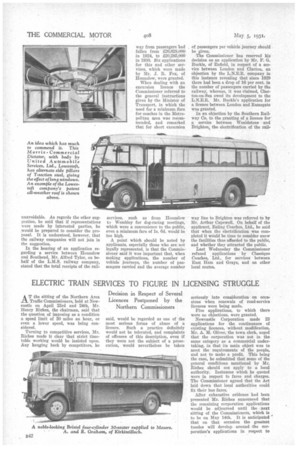METROPOLITAN COMMISSIONER AND A REPRESENTATIVE CASE
Page 59

Page 60

If you've noticed an error in this article please click here to report it so we can fix it.
The M.H.C.S.A. Puts Forward a Suggestion to Save Time, Trouble and Expense A T the public sittings held by Mr. .tI.Gleeson Robinson, the Metropolitan Traffic Commissioner, in London during the past few days, an interesting case heard was that concerning applications made by the South Midland Motor Services, Ltd., of Oxford, for backing of a road service licence for express carriages between London and Oxford, this application being opposed by Varsity Express Motors, Ltd., and others, including the London General Omnibus Co., Ltd., and Green Line Coaches, Ltd.
Mr. St.. John Raikes, K.C.. for the Great Western Railway Co., asked the representative of the South Midland company how fares were arranged, and
was told that they were agreed with competing companies, some of which were associated with the G.W.R. company. The applicant concern intimated that, on the basis of the traffic dealt with, the company wished to increase its services, employing 10 coaches instead of seven coaches.
An important statement was made by Mr. Robinson* when he said that, in the absence of evidence to the contrary, he was quite prepared to take it that the railways were providing an adequate
service on this route, that being the case put forward by Mr. Raikes. Mr. Robinson continued, however, that, despite railway facilities, there was a public demand for coaches, the extent of which it was his duty to determine, considering whether the application was justifiable or constituted wasteful competition.
The Commissioner said that this service, having existed in the past, was evidently necessary and desirable, and he was prepared to grant the backing, subject to certain conditions. He was not, however, satisfied that an increase of the service was justified at present.
On behalf of the Motor Hirers' and Coach Services Association, of 72, Great Portland Street, London, W.1, Mr. Norman King put forward the reasonable suggestion that a really representative ease should at the earliest possible moment be considered by the Commissioner, provided agreement in this respect could be come to with the railway companies generally. The principles which were laid down in the hearing of such a case would be of the greatest assistance to all parties.
He drew attention to the difficulties. of an applicant whose route passed through three traffic areas, in that the backing for the intermediate area might be refused whilst the other Commissioners were willing to license the service, the result being considerable waste of time and money. He said that he understood the M.H.C.S.A. had made representations to the Minister of Transport, and he thought there was every possibility that the Minister would be glad to receive Mr. Robinson's observations and those of other Commissioners.
The Commissioner replied that he appreciated the difficulty of routes extending over three traffic areas, but iegarded it as an inherent one and quite
unavoidable. As regards the other suggestion, he said that if representations were made by interested parties, he would be prepared to consider the proposal. It is understood, however, that the railway companies will not join in the suggestion.
In the hearing of an application regarding a service between Hounslow and Southend, Mr. Alfred Tylor, on behalf of the L.m,s. railway company, stated that the total receipts of the rail
way from passengers had fallen from £26,628,000 in 1924, to £20,285,000 in 1930. Six applications for this and other services, which were made by Mr. 3. R. Fox, of Hounslow, were granted.
When dealing with an excursion licence the Commissioner referred to the general instructions given by the Minister of Transport, in which the need for a minimum fare for coaches in the Metropolitan area was reCOMmended, and remarked that for short excursion
services, such as from Hounslow to Wembley for dog-racing meetings, which were a convenience to the public, even a minimum fare of is. Od. would be too high.
A point which should be noted by applicants, especially those who are not legally represented, is that the Commissioner said it was important that, when making applications, the number of vehicle journeys, the number of passengers carried and the average number of passengers per vehicle journey should be given.
The Commissioner has reserved his decision on an application by Mr. F. G. Buckle, of Enfield, in respect of a service between London and Clacton, an objection by the L,N.E.R. company in this instance revealing that since 1929 there had been a drop of 16 per cent, in the number of passengers carried by the railway, whereas, it was 'claimed, Clacton-on-Sea owed its development to the L.N.E.R. Mr. Buckle's application for a licence between London and Ramsgate was granted.
In an objection by the Southern Railway Co. to the granting of a licence for a service between Wealdstone and Brighton, the electrification of the rail
way line to Brighton WAS referred to by Mr. Arthur Capewell. On behalf of the applicant, Ealing Coaches, Ltd., he said that when the electrification was completed it would be time to consider anew the facilities thus afforded to the public, and whether they attracted the public.
Last Wednesday the Commissioner refused applications by Classique Coaches, Ltd., for services between East Ham and Grays, and on other local routes.




































































































